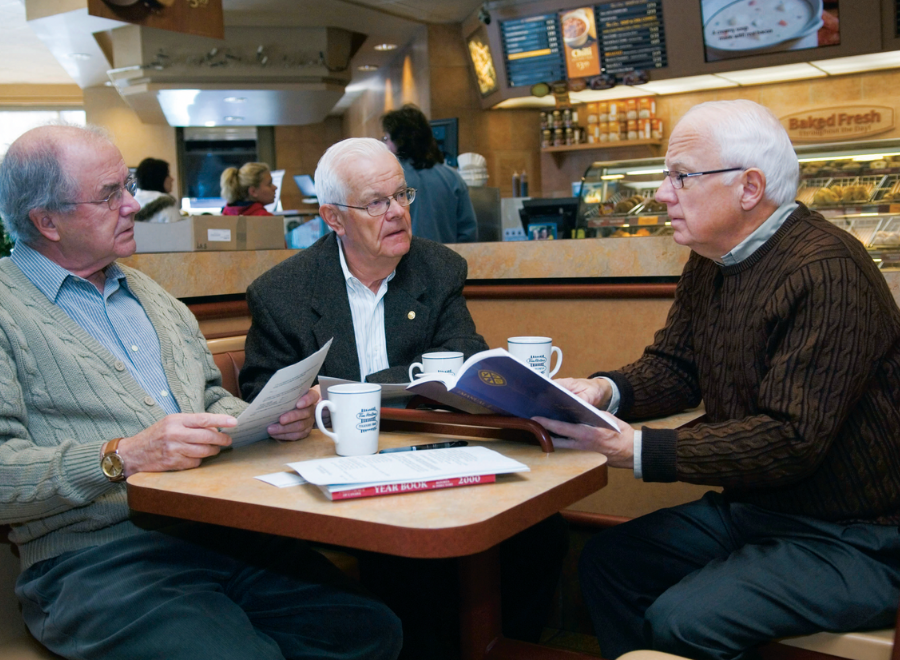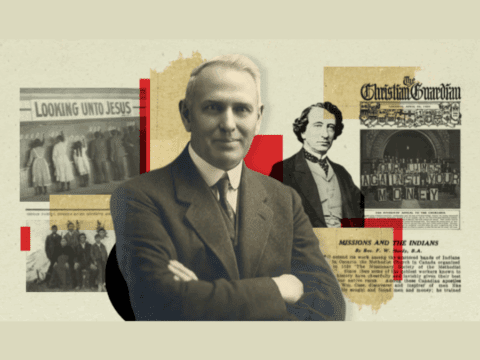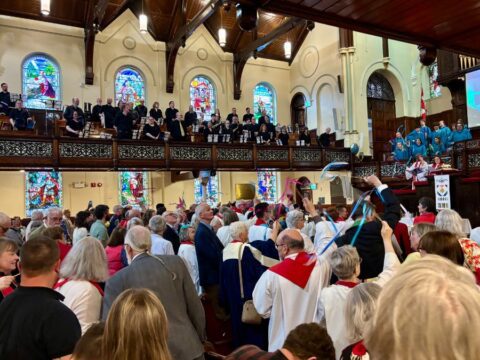Applause fills the sanctuary of Wellington Square United in Burlington, Ont., as General Council pensions staffperson Susan Jones delivers the news to a group of United Church retirees: despite world economic turmoil, their conservatively invested $1.2-billion pension fund is in good shape. So they will get a planned 4.1-percent increase next year, keeping pace with inflation.
The 80 Hamilton Conference retired ministers, lay workers and spouses respond less enthusiastically to the news that health and dental plan costs are going up by five percent. But most seem satisfied with the overall gist of what they’ve heard; when Jones concludes her report, the group has no questions.
The same night, retirees in York Presbytery are meeting over coffee and raising plenty of questions about their pensions and how the church prepares its employees for retirement. They recently surveyed retirees and found that while few, if any, church retirees live in abject poverty, one-third of respondents were still working full- or part-time, 30 percent had been unable to buy homes and 44 percent had no Registered Retirement Savings Plans (RRSPs). The majority say they got no help with financial planning from the church, no pre-retirement advice. Most are worried about having enough money.
They probably should be: Canadian life expectancy is now up to 80.4 years, and, according to General Council pension and benefits manager Linda Begley, United Church retirees as a group have exceptional longevity. With half of current United Church ministers set to retire within a decade, questions about pensions and how the church treats its retirees are certain to mount.
The York Presbytery survey was done after Rev. John Harries, himself retired for five years, took over as Presbytery pension convener and began meeting with retirees including Rev. John Houston and Rev. David Estey. Houston had visited many other retirees who seemed to be struggling with finances. More than half of the members of a Presbytery-backed retirees association responded to the survey.
“There’s some angst out there, some real concerns,” says Harries. The survey led to recommendations to senior church officials and the General Council’s pension advisory committee that include increased pension benefits, an end to housing allowances in favour of a “fair and adequate salary,” and church-wide associations to help retirees connect with colleagues and friends.
Many of the York Presbytery retirees’ findings parallel those of two reports to the 2006 General Council: a compensation study that called for comprehensive salaries for ministers, and a report on isolation in ministry that found 44 percent of ministers feel lonely and have no strong social networks.
The United Church’s pension plan compares more than favourably to many corporate plans. Like most public-service pension plans, it pays pensions from a formula based on earnings. Compared to some teachers’ and public-service pension plans, for example, it provides moderate returns but is relatively stable. With the recent turmoil in the financial markets, United Church pensioners who might have once griped about their benefits are likely now counting their blessings — and thanking the volunteers drawn from the financial and pension industries who oversee a conservative investment strategy.
Some well-heeled public-sector pension funds face future funding shortfalls due to demographics and generous benefits that are pushing pension contributions as high as 12 percent, for both employer and member. In the United Church, the employer (usually a congregation) pays seven percent, and the plan member (usually a minister) pays four percent.
“One of the guiding principles is to keep the pension plan affordable,” says pension and benefits manager Begley.
“The reality of pension plans is that you get out what you put in,” says Jim Blanchard, chair of General Council’s ministry employment policies and services committee. “If you want to have better benefits, you have to pay for them.” Some second-career ministers, he says, mistakenly think they will receive full pensions after as little as 15 years in the pastorate.
Still, the church pension plan holds up fairly well in a direct comparison. Ministers at minimum salary, for example, retiring at age 65 after 30 years’ service, have a slightly higher pension income, including Canada Pension Plan payments, than Ontario teachers with 30 years’ service earning the equivalent amount during their five best years.
The difference is that the teachers normally retire up to 10 years before the ministers — once years served and age add up to 85 — and they usually earn more than ministers in the first place. The bottom line is a more lucrative pension.
Early retirement is rarely an issue among ministers, since the average age of those entering the pension plan is 47. A record number of 175 retired ministers now have pastoral charge appointments; 35 ministers have extended their retirement past age 65.
“The stereotype is that ministers can’t quit. They just love preaching at 11 a.m. Sunday morning,” says Harries. Actually, he says, many keep working to maintain their pre-retirement lifestyle. The moral of the story: if you want to give up the Sunday morning grind, start planning early.
For this reason, Rev. Allen Warren, minister of the St. George (Ont.) pastoral charge, should be the poster boy for retirement preparation. At 51, a decade before his earliest retirement date, he’s investing in RRSPs. About 10 years ago, he and his spouse realized home ownership had to be part of their financial plan; his next move was to a pastoral charge with a housing allowance.
“You choose this profession out of a sense of calling, and it’s only when you get closer to retirement that you think about realities,” he says.
Peter Scott, who retired as executive secretary of London Conference about two years ago, says any planning is rare. He blames denial. “People put it off and think, ‘I’m okay.’’’
Over the years, Scott arranged financial seminars for ministers, but response was lukewarm. Now, along with a retired Presbyterian overseas worker, he hosts ecumenical three-day pre-retirement retreats, through the Toronto-based Centre for Clergy Care.
Ministers and spouses who attend these retreats look at finances, plus “the deeper stuff,” says Scott. That includes identity, changing relationships, aging, health and death. Scott believes the church could subsidize such events and classify them as continuing education. David Estey, who once served in the armed forces, says similar five-day seminars were standard-issue for retiring military chaplains.
For now, General Council staff are planning a pre-retirement resource that could be available as early as the end of next year.
It’s a good start. Harries and his fellow retirees realize that changes in the church take time. So, he says, “we are trying to raise the issue for the next generation of church professionals.”
***
This story first appeared in The United Church Observer’s December 2008 issue with the title “Golden years, anxious times.”














